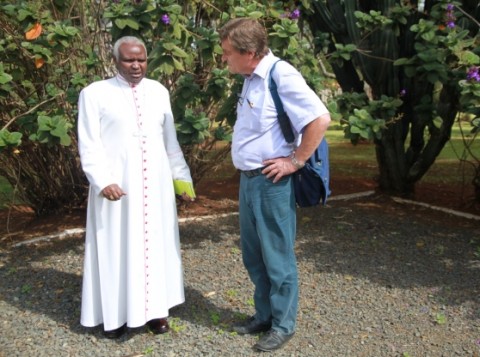Kimmo Kiljunen visited Finn Church Aid’s peace work programme in Northern Kenya
The state should be able to acknowledge local people and the tensions between them, said Kimmo Kiljunen, Adviser for the Ministry of Foreign Affairs of Finland, in Northern Kenya in late June. Kiljunen became acquainted with FCA’s on the ground peace work in the area. He also met with Eldoret’s diocese’s bishop, Cornelius Korir, who is a pioneer in peace work in the border district of Turkana and Pokot.
Bishop Cornelius Korir received the guests at his own house in Eldoret. Adviser for the Ministry of Foreign Affairs of Finland, Kimmo Kiljunen, has researched and explored peace in different contexts around the world. Bishop Korir is trusted and familiar man in the provinces of Northern Kenya. He started negotiating the local tribal disputes last December.
The composition is clear and unequivocal for a person who has followed the lives of northern tribes for a long time.
“The worst enemy is hunger. In the center of all disputes is food, cattle and water”, bishop Korir says.

Eldoret’s bishop Cornelius Korir started peace work in Turkana and Pokot last year’s December. The advisor for Foreign Ministry Kimmo Kiljunen has studied the concept of war and peace in different contexts around the world.
“People only have one archaic way of thinking: a gun equals food and livelihood. If you take the guns away from us, what is left, people asked me”
At the end of last year, bishop Korir truly started looking for options for killing. He invited tribal communities and villages to attend and asked what caused the disputes. First, there were ten invited participants, then twenty, then forty.
“Usually the answer was that they didn’t mean to kill anyone, but it happened in tumult of the cattle theft. In many communities, killing is considered bad, and it is followed by a cleansing ceremony. On the other hand, it can also be admired and seen as an accomplishment” Korir says.
As the negotiations went further, the representatives of the tribes and villages brought up the importance of education and alternative livelihoods.
“This is a new way of thinking that didn’t use to exist before” the bishop rejoices.
Peace, education and livelihood go together
Northern Kenya covers nearly half of Kenya. Finn Church Aid works in six provinces: in Wajiri, Marsabiti, Isiolo, Garissa, Turkana and Pokot.
Many organisations are building more sustainable life to the nomadic tribes of the North through livelihood and education. At the same time, they are offering a way out from a lifestyle based on cattle thefts and violence. FCA is focusing on peace building in Northern Kenya.
The work is being managed by Adeso, African Development Solution, a development cooperative organisation, and funded by the United States government’s USAID. Finn Church Aid has however expanded the programme also to the Pokot province.
“We found in our review that the disputes in Turkana cannot be solved without including the northern neighbour Pokot”, says John Bongei, a Programme Coordinator for Kenya’s northern peace work.
Power plant aggravates tensions further
Between Turkana and Pokot, there is a narrow area, which is commanded by a river. The water has therefore become a natural border and a source of dispute. Kenya’s state energy company has aggravated the relationship between the tribes further by building a power plant. If you ask turkanas the power plant is on pokot side and if you ask pokots it is on turkana side. Also this question is controversial as many others in this region.
“The state should be able to take into consideration the local people and the tensions between them on their own projects. The energy company should form a separate plan to support the local people and also to be equal to all the tribes” analyses Kimmo Kiljunen.
The only contact between the state and the secluded areas is the building of the power plant. There are no other state or province structures or services.
You cannot eat the borders
In the village of Kainuk, there is an authentic African baraza, a village meeting, waiting for the visitors. Also present is Elijah Kodoh, the province’s vice commissioner, drawn in by the foreign guests.
“We have a lot to share: water, hydroelectric power and even gold,” he says enthusiastically to the villagers.
Reconciliation is however needed first, and on its way are the notions of own tribal territorial borders.
“Forget the borders for a minute and think that you cannot eat the borders. Peace and reconciliation should be your own decision. It cannot be brought” Kodoh continues.
Support can be brought only when there is peace
Finn Church Aid’s peace work’s main principle is that peace comes from the people and the community itself. Peace is also a prerequisite for all other development.
Kimmo Kiljunen has been speaking of peace before.
“There are disputes on every level. Even states fight each other and every family has disputes. Do you have disputes with your spouse?” he asks the public meeting.
“Disputes can be solved by listening. Through that comes understanding towards one another and through that respect can be born and through that reconciliation” he continues.
Kiljunen assures that Finland and the Foreign Ministry are ready to support Northern Kenya’s efforts for peace, as long as the conflicts are settled.
” The responsibility is yours”, Kimmo Kiljunen says, leaving the decision to the listeners.
The men of church working in cooperation with Finn Church Aid feels the same way: no empty promises are given in peace work, instead people are put to work.
The first steps are being taken in Kainuk: two disputing villages agreed that they both have the right to the gold found in the region’s ground, and that on Tuesdays a common market is held. Members from both villages can sell their products in peace at the market.
Text and photos: Hilkka Hyrkkö